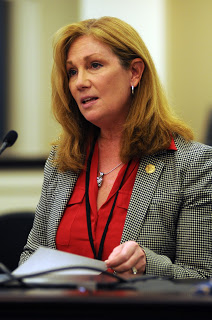Bill to allow opt-out of mandatory vaccines in an epidemic passes House, after what one lawmaker called a ‘disclaimer’

Rep. Kim Moser (Legislative photo from Jan. 6)
—–
By Melissa Patrick
Kentucky Health News
With what one lawmaker called a “disclaimer,” the House changed and passed a Senate bill to let Kentuckians opt out of a mandatory vaccination during an epidemic.
“In my many years of being here, this is the first time I’ve ever seen a disclaimer read before we actually had a vote,” said Rep. Jim Gooch of Providence, who was first elected to the House in 1994.
He was referring to fellow Republican Rep. Kim Moser’s speech for the bill, in which the chair of the House Health and Family Services Committee talked more about the virtues of vaccines than the importance of individual liberties.
After referring to Kentucky’s poor health and giving some recent history of vaccines, Moser, a retired nurse from Taylor Mill, said, “Vaccines are meticulously researched, and have been proven safe. It is imperative that our citizens understand the realities of these diseases when deciding whether or not to get a vaccine.
“Civil discourse has been strained this year and with mandates being opposed, the result has been an erosion of public trust. This has influenced vaccine hesitancy and I understand that. So it is critical that we get back to a place where we are listening and we are being civil in our approach to resolving differences and come to a better understanding of disease prevention and public health protections.
“Personal civil liberties must be balanced with the rights of persons not to be infected and likely killed by a deadly disease, especially if they cannot be vaccinated for medical reasons.
“This legislation would expand those exemptions to adults with a conscientious objection during an epidemic. But we must all be mindful of the risks not only to ourselves, but to others when we make these decisions.
“Vaccines do save lives, they prevent the spread of dangerous diseases. That being said, individuals should talk to their doctor to decide if this is a safe vaccine for them. Ask your trusted healthcare provider to help you interpret research data and articles that you may read.”
Senate Bill 8, sponsored by Sen. Mike Wilson, R-Bowling Green, would allow adults. emancipated minors and parents making decisions for their children to opt out of mandatory vaccines in an epidemic for religious grounds, medical reasons or a “conscientiously held belief.”
The bill does not change any current school immunization requirements, which allow exemptions for medical or religious reasons only, nor does it impact any workplace requirements.
Wilson has said he supports vaccinations, but filed the bill because of the concerns of so many people who had reached out to him who were concerned that they would be required to take a vaccine. An old state law allows the health department to mandate vaccines “in the event of an epidemic in a given area,” but Gov. Andy Beshear has said he does not plan to require the Covid-19 vaccine.
Moser said federal law prohibits any vaccine approved under emergency-use authorization, like the current Covid-19 vaccines, to be mandated under federal law.
Rep. Lisa Willner, D-Louisville, in opposition to the bill submitted a statement read by Democratic Floor Leader Joni Jenkins of Shively: “Health provider groups and health advocacy organizations oppose Senate Bill 8. . . . It’s irresponsible and reckless to weaken vaccination requirements during epidemics.”